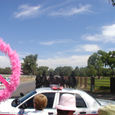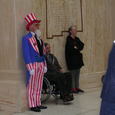« Important Drilling Santa Fe Meeting Coming 8.23.07 | Main | Early Bird Registration Ends Today for Workshop on Nonprofit Advocacy »
Wednesday, August 15, 2007
Cheney Predicted Iraq Invasion Would Produce Quagmire
The prediction is contained in a post-Gulf War interview from April 15, 1994 that's shown in the video above. The interview took place more than a year after Cheney left office as secretary of defense under President George Bush the First. Cheney explains why invading Baghdad, taking out Saddam Hussein and getting caught up in what would amount to an American occupation of Iraq would be a very bad idea. His arguments are convincing. Too bad he didn't heed his own counsel when contemplating starting a unilateral, unprovoked attack on Iraq in 2003, resulting in who knows how many years of quagmire.
As reported in a column earlier this year by Helen Thomas, Cheney offered similar reasoning in 1991:
After the first Persian Gulf War ended in March 1991, Cheney -- then serving as defense secretary in the first Bush administration -- was asked on ABC-TV why Operation Desert Storm had not gone all the way to remove Saddam Hussein from power.
He replied prophetically: "I think for us to get American military personnel involved in a civil war inside Iraq would literally be a quagmire. Once we got to Baghdad, what would we do? Who would we put in power? What kind of government? Would it be a Sunni government, a Shia government, a Kurdish government?
"Would it be secular, along the lines of the Baath party? Would it be fundamentalist Islamic?" he asked. "I do not think the United States wants to have U.S. military forces accept casualties and accept responsibility of trying to govern Iraq. It makes no sense at all."
Yet, according to Bob Woodward in his book, "Plan of Attack," Cheney was the most passionate advocate within the second Bush administration for an Iraq invasion in the run-up to the 2003 war:
Adding to the momentum, Woodward writes, was the pressure from advocates of war inside the administration. Vice President Cheney, whom Woodward describes as a "powerful, steamrolling force," led that group and had developed what some of his colleagues felt was a "fever" about removing Hussein by force.
... Cheney engaged in a bitter and eventually winning struggle over Iraq with [Gen. Colin] Powell, an opponent of war who believed Cheney was obsessively trying to establish a connection between Iraq and the al Qaeda terrorist network and treated ambiguous intelligence as fact.
Powell felt Cheney and his allies -- his chief aide, I. Lewis "Scooter" Libby; Deputy Defense Secretary Paul D. Wolfowitz; and Undersecretary of Defense for Policy Douglas J. Feith and what Powell called Feith's "Gestapo" office -- had established what amounted to a separate government.
Ironic, isn't it, that Cheney castigated critics of invading Iraq in 2003 who made the very same arguments against the action that he had made in the era of the first Gulf War? Insulated in the neocon cocoon of the second Bush White House, Cheney became the main pusher of the nightmare scenario he had earlier argued so strongly against. Unfortunately, we'll all be paying for his delusions in a myriad of ways for decades to come. Meanwhile, the numbers of those killed, maimed or displaced by Cheney's madness continue to mount, and he's still stubbornly defending the continuation of the war and predicting our ultimate "victory." Sen. Pete Domenici, Rep. Heather Wilson and Rep. Steve Pearce are right there with him.
August 15, 2007 at 09:38 AM in Iraq War | Permalink









